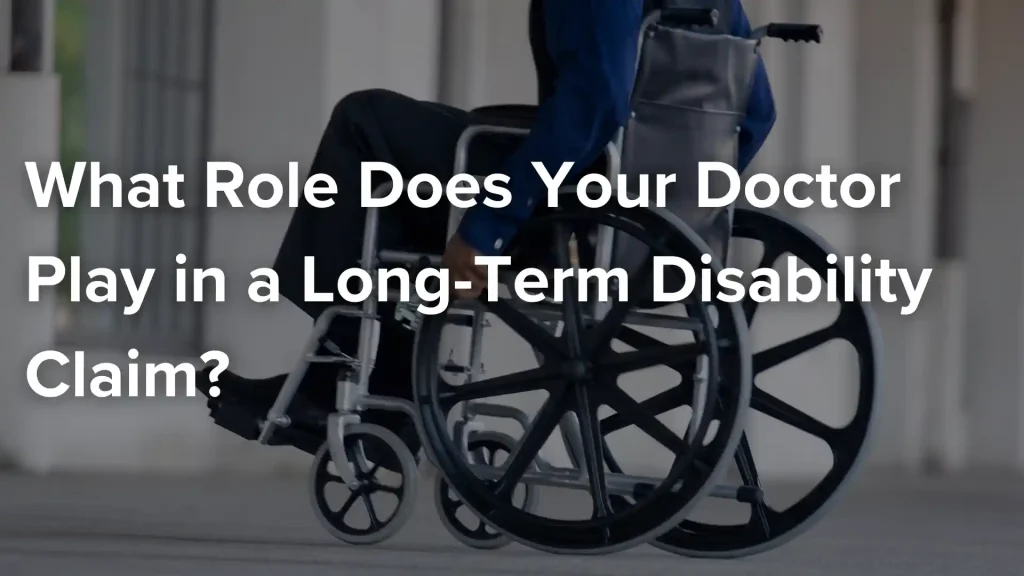Posted on Saturday, June 14th, 2025 at 9:00 am
 If you’re filing for long-term disability (LTD) benefits, your doctor’s role significantly affects your claim outcome. Insurance companies don’t just take your word for it—they rely heavily on medical documentation and your physician’s opinion. Strong doctor support for your LTD claim can make a significant difference, as clear, consistent notes from your healthcare provider help validate your condition.
If you’re filing for long-term disability (LTD) benefits, your doctor’s role significantly affects your claim outcome. Insurance companies don’t just take your word for it—they rely heavily on medical documentation and your physician’s opinion. Strong doctor support for your LTD claim can make a significant difference, as clear, consistent notes from your healthcare provider help validate your condition.
Your application could be delayed or denied without strong doctor support for LTD claim efforts. Here’s what you need to know about your doctor’s role in an LTD claim and how to get them involved. One common question is, what type of doctor should you see to support disability? The answer depends on your condition.
Why Doctor Support Is Essential for Long-Term Disability Claims
Long-term disability insurance providers require objective proof of your condition. While your personal statement is essential, it’s not enough. Insurance companies place a lot of weight on forms and letters submitted by your doctor.
Strong treating physician support gives your claim credibility and structure. It helps insurers understand how your medical condition affects your ability to work.
Your long-term disability medical records should include appointment notes, test results, and a precise diagnosis. That isn’t all the insurance company wants to see, however. They also want a direct opinion from your healthcare provider stating that your condition is disabling, how your condition limits daily activities, and whether you can still work in any capacity. Your application might appear incomplete if your doctor only sends chart notes and lab results.
Please read more about residual disability benefits here: What Are Residual Disability Benefits?
What Your Doctor Should Provide for a Strong LTD Claim
So, what should your doctor provide for a strong LTD claim? First, you’ll need a detailed Attending Physician Statement (APS). The APS is a common form that insurers send to your doctor. It includes questions about your diagnosis, treatment, and how your condition impacts your function. A vague or incomplete attending physician statement for LTD can hurt your case.
Ensure your doctor describes your symptoms clearly and states any specific work-related restrictions. They should also note whether your condition is expected to improve.
You’ll also need a Residual Functional Capacity (RFC) assessment. An RFC form for long-term disability measures your physical and mental ability to work. It asks your doctor to evaluate your ability to sit, stand, walk, lift or carry weight, and your ability to concentrate, remember things, and manage stress.
Insurers use this to compare your capacity with your job duties. A supportive RFC form can make or break your claim.
Finally, the doctor should write a statement for your disability claim. The doctor’s role in winning your case is crucial; their detailed documentation and professional opinion can provide the medical proof. This letter should explain your condition, prognosis, and why you cannot work. Note that the language your doctor uses matters. A simple, strong sentence like “In my medical opinion, the patient cannot maintain full-time employment” is very persuasive.
How to Talk to Your Doctor About Supporting Your Disability Claim
 Talking to your doctor about your disability claim is often new territory for most people. Here’s how to handle it:
Talking to your doctor about your disability claim is often new territory for most people. Here’s how to handle it:
Be Honest About Your Limitations
Many people try to appear stronger than they feel in front of doctors. This can backfire when applying for disability benefits. Your doctor needs an accurate picture of your symptoms. Be open about:
- How does your condition impact your daily routine
- Side effects from medication
- Pain levels or cognitive issues
Doctors can’t support your claim if they don’t fully understand your struggles.
Schedule a Focused Appointment
Don’t bring up your LTD claim at the end of a regular visit. Instead, schedule a separate appointment specifically to talk about your disability certification with a physician. Bring copies of any forms your insurer provided. Ask your doctor to go through them with you and clarify anything that seems confusing. This gives your doctor time to offer thoughtful, detailed answers.
Know What to Say—and What to Avoid
Finally, you might feel uncomfortable when asking your doctor for support. That’s normal. However, your physician’s role is to treat and advocate for your health. Try saying:
- “I’m applying for disability benefits because I can’t work full-time.”
- “The insurance company needs your input on my limitations.”
- “Can we go over this insurance disability form together so I don’t miss anything important?”
Avoid pressuring your doctor or asking them to “just sign it.” Most doctors want to help, but only if they believe your condition limits your ability to work.
Professional Support for Your LTD Claim
The doctor-patient relationship is central to any long-term disability claim in Pennsylvania, but getting the right documentation can be tough when unsure what you need. Unfortunately, without clear, consistent medical evidence for LTD approval, insurers often deny legitimate claims. Our team is here to help you understand your rights and take the first step toward securing the necessary benefits.
Contact Capitan Law by calling (267) 419-7888, and let us help you navigate the disability claim process.